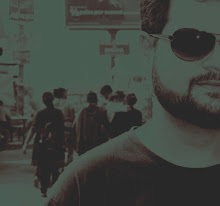 |
| A Slice of Life! |
A deaf and mute
protagonist, named after Murphy radio has, for his first flame, a girl called
“Shruti” and for his life, an autistic charmer named “Jhilmil” who brings
things, all bright and gay, into his life. Interestingly ironical! Anurag
Basu’s episodic film is a celebration and felicitation of love. Last week, we
have celebrated the relationship of two men who “suffer” “psychological”
aberrations in Chitrangada:
The Crowning Wish, and this week we delve into the world of two characters
who are, otherwise again, marginalized. The common point of reference:
liberation. As Jhilmil enjoys the fireflies through the soap bubbles at night,
as she looks at the white rat, as she tries to run after the butterfly and as
she pampers the “little lamb”, we wonder at the film, “Anurag Basu, Did he who
made Kites, made thee?”
Animal metaphors run for that sense of liberation, miles away into the world of
three people, who can defy conventions, knowingly or unknowingly, and are not
“boxed” up in their world of challenges. Barfi,
at the end of the day, is a tale of love that doesn’t alter even when “its
alteration finds” or “bends with the remover to remove”.
A movie can thrive
only on its cast and Barfi proves it again. The lineage of Ranbir
Kapoor is deliciously put on fire by the performance of this Ghazab Prem. Smiling all the way is this
actor who was once so vehemently criticized for his towel-debut in Sawaariya. He proves his mettle
again as he dwells in his world of eloquent silence. Priyanka Chopra delivers a
flawless performance, well almost, as autistic Jhilmil. Her movements are
Khan-inspired, but her vibrancy and innocence light up the second-half. But
cheers to this lady called Ileana D’Cruz. As the sutradhar of the film, she is a natural talent
throughout. Her charming smile, her saree-clad appearances and her endearing
calmness on that face add to her performance. Basu surely deserves praise for
this wonderful search.
Barfi is a delight to the senses.
Acoustically, the background score and the music are its assets. The orchestra
that lingers in the camera-frame now and then, reminding you of Basu’s Metro, is as tasty as the bite of a
kaju-Barfi. Pritam has always the best for two people in Bollywood, Emran
Hashmi and Anurag Basu. Barfi is no exception. And yes, Darjeeling, Ghoom to be precise and Kolkata streets
perhaps never looked so ethereal in the recent past. North Bengal’s flora is
captured brilliantly in Barfi and Chhau dance and Jhilmil’s dream sequence
are indeed a mid-Autumn's evening’s dream! Thanks to Ravi Varman, who weaves
magic throughout the one fifty minutes of the saga of love. A particular scene
just flashes across my mind: Jhilmil hides in Barfi’s room, her face lightens
in the close up and on the other side of the screen in Barfi, enlightened on
his own, lightened by the D.O.P, making the moment, and the frame, surreal. As Ghoom, (Sleep in English), the
film surely sets a space for a nostalgia driven, lotos-eaten slumber, as we
move with the protagonists on the roads of Kolkata, and through the alleys of
the hill station, trying to find a destination away from the crossroads of life
and its trials.
Barfi redefines
film-making. The lack of a story becomes the art for storytelling for the
director, the lack of dialogues become a panorama of silence and the lack of
effort on the part of the actors become a seamless and rhythmic flow of
emotions on the screen. To add to the performances are veteran Haradhan
Bandopadhyay’s Daju, Roopa
Ganguly and the brilliant Saurabh Shukla, who returns to screen after a long
hiatus, I guess. His encounters with Chaplinesque Barfi are breath-taking.
This movie is an
addiction for sure. For two challenged lives who fail to judge the pros and cons
while falling in love, life becomes a fairy tale. Barfi is more of a fantasy than a film.
After a long time, a film that doesn’t provide a premise for mushy romance
actually makes you weep: not on the frailties of the characters, but on the
lack of simplicity in our lives. Basu never merges on the intellect, nor does
he philosophize, yet simple truths are so faultlessly offered in the film. Only
if the continuous stretch of flashback narrative could have been avoided and
the duration of the film rendered a few minutes less, the film would not have
dragged in the second-half. But that’s okay. For those who have a tooth for
sweet Barfis, the lengthier the barfi, the better!
Cashews, almonds,
groundnuts and pistachios, all grounded together by the director here, who has
taken the “risk” to tread on his own path. After all, “life mein sabse bada risk hota hai
kabhi koi risk na lena” and hats off Mr.
Artist, for the courage.
Diabetic, anyone?
Try a bite of Barfi, in
the pre-Puja session, let it melt in your mouth till you crave for another one.

No comments:
Post a Comment